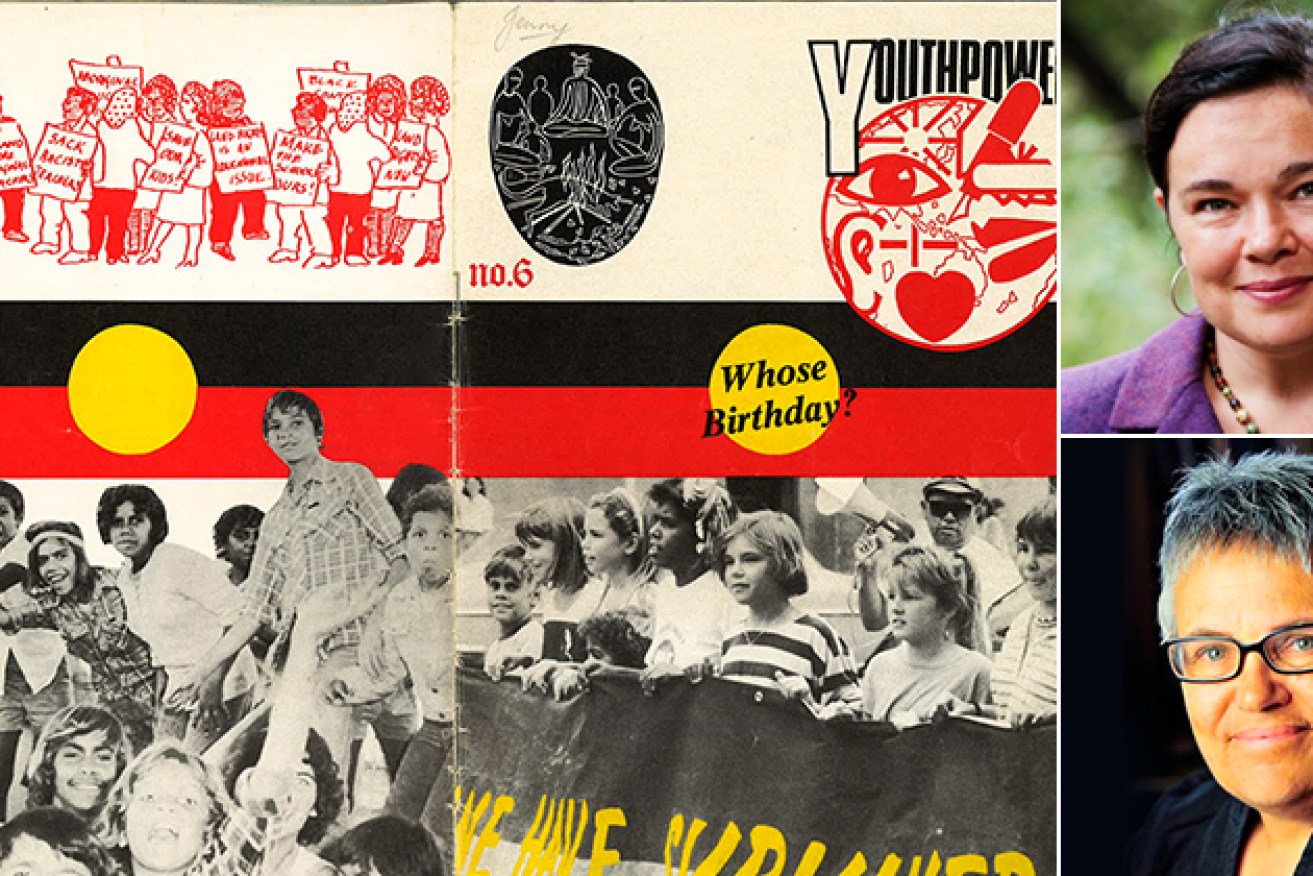
Doco shows Flinders links to ’88 protest

Above left, Ali Baker (centre) in 1988. Top right, Ali now; bottom right, Jenny Baker
“Let us renew that commitment, our commitment to Australia and Australia’s cause – the cause of freedom, fairness, justice and peace.”
As Bob Hawke spoke those words at the bicentennial celebrations in 1988, most Australians felt he was telling their story; the inspirational story of Australia.
But there were two stories in Sydney that day. In fact, as far as 100,000 other Australians marching towards Hyde Park were concerned, there were two Australias.
Hawke’s Australia was a young, aspirational, larrikin country proud of its colonial past and moving forward with its eyes fixed firmly on the future.
For those other Australians, led by 30,000 Aboriginal people from across the country, Australia was a much older country; and one with a painful, living legacy of discrimination and exclusion that cried out for recognition and reconciliation.
ABC’s documentary 88 recently told the story of some of those Aboriginal Australians. Among them were Jenny and Ali Baker, a mother and daughter with a long and fruitful association with Flinders University.
Jenny and Ali’s story, and the stories of their fellow Aboriginal marchers, are of journeys of thousands of kilometres without air conditioning in the scorching heat of January to make sure “their” Australia was not forgotten.
But perhaps most importantly, they are stories that, for many, would end in a protest that would become a significant marker on the long road towards a reconciled Australia that truly reflected Bob Hawke’s words.
In 1988 Jenny was working as a nurse for the Aboriginal Medical Service and was already a keen advocate for Aboriginal rights. She said she was inspired by her trade unionist father, who taught her from a young age that people had to fight for their rights.
A Mirning woman whose mother and grandmother were born either side of the Nullarbor plain, she would go on to complete a Masters in Public Health and then, through the Department of Women’s Studies, become the first female Aboriginal Doctor of Philosophy at Flinders University.
Now Associate Professor of Aboriginal Health at The University of Adelaide, she told of how she almost didn’t make the journey to Sydney, and how it had affected her life.
“We hadn’t planned to go to Sydney at all that day,” Jenny said. “I was working as a nurse for the Aboriginal Medical Service and went during my lunch break to the supporting march in Adelaide. I made the decision on the spot to go with Ali and my son Len.
“I called work, told them I was going and that they would see me in a week or so. I felt strongly that taking part in the protest was more important than any job.”
In 88, Jenny describes a range of emotions during the journey. She speaks of the “dramatic decision” to go, of feeling intimidated at a stop-over later in the journey when some of their fellow travellers partied and danced as a band played Little Richard’s Great Balls of Fire – and of how her children reassured her and urged her to go on.
Ali, who was 12 at the time, is now Coordinator Tjilbruke Student Services at the Flinders University’s Yunggorendi First Nations Centre for Higher Education and Research. She is also a lecturer and student adviser.
She described how an initial sense of nervousness among the Aboriginal marchers turned to jubilation and tears of joy when they discovered tens of thousands of supporters waiting for them in Sydney.
“We really hadn’t known what to expect,” Ali said. “The march had started with 30,000 Aboriginal people and we didn’t know that they had arranged for non-Aboriginal supporters to meet us.
“I just remember turning the corner and seeing all those people there waiting for us. Then everyone was crying because for the first time we felt that we were not alone and that there were other people who cared about us and our history.”
For Jenny, it was a moment that added momentum to the long process of changing how Aboriginal people were treated and viewed in Australia.
“I believe it was a significant marker in a long line of struggles that includes the Gurindji walk-off, the Day of Mourning in 1938, the 1967 referendum, the Royal Commission into Aboriginal Deaths in Custody, and the Bringing them Home report, which led to a refusal to apologise from Prime Minister Howard and then an apology from Prime Minister Rudd,” she said.
Both women have continued their work for Aboriginal rights and social justice, Jenny as Associate Professor of Aboriginal Health at The University of Adelaide and through publishing her PhD thesis, Theorising Survival: Indigenous Women and Social and Emotional Wellbeing.
Ali continues to make a difference in the lives of Aboriginal students through her work at the Yunggorendi Centre, which in 2012 received an Australian Government Citation for Outstanding Contributions to Student Learning.
Both are thankful to have been in Sydney in 1988, and believe some progress has been made since. But they also believe many opportunities have been missed, and that there is a long way to go before Australia can truly claim to be the place of “freedom, fairness justice and peace” that Bob Hawke spoke of.
“I think that there was the possibility of a different kind of country at that time – a more inclusive and thoughtful country,” Ali said. “Right now there is still a national amnesia that continues to exclude Aboriginal and Torres Strait Islander people from days of national remembrance like Australia Day/ Invasion Day/ Survival Day.
“Aboriginal people continue to struggle without constitutional recognition or any kind of agreement or treaty, and the Northern Territory intervention continues.”




